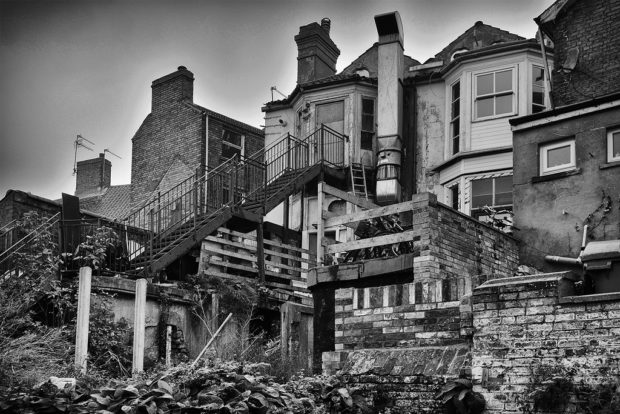You have no items in your cart. Want to get some nice things?
Go shopping
The fifth and final interview of the day is in a run-down Victorian house, savagely cut into bedsits by a landlord only interested in profit. A house instantly recognisable to anyone who has ever lived in South London. I shuffle into the doorway, out of the winter rain and double check the address before pressing the bell. I have forgotten my gloves, or lost them again, and my fingers are bright red where I worry the skin from their sides. It’s nearly eight o’clock. I’m tired and overflowing with other people’s misery.
John’s neighbour answers and leads me through a barren and dimly lit hallway to his bedsit. She opens the door and shouts a hello. She stands in the hallway, reluctant to cross the threshold if she doesn’t need to, waiting for confirmation before she ushers me in.
John’s bedsit would once have been the kitchen for the whole house. It’s a long corridor of a room, with units that stretch most of the way down the left-hand wall. His bed is wedged, uncomfortably, in the space at the end of the units, blocking the door to the garden. The kitchen counters are covered with the remains of ready meals rotting in their plastic trays and richly furred mugs of instant coffee that cluster together, as though for safety. Dirty plates and pans tower out of the sink and slump on the draining board. Rubbish bags gape from cupboard handles, their insides slick and moist. Crusted saucers of half-eaten cat food fill the corners of the room. And everywhere there are ashtrays overflowing with cigarette butts, bottle tops and roaches.
The smell is unbearable. I take a few breaths through my mouth to see if it helps, but the air seems to enter my body more deeply, to contaminate me more fully, so I switch back to breathing through my nose.
I step carefully into the room, trying to find a path to the bed without dislodging the empty bottles that stand two or three deep along the edge of the room and in front of the cupboards.
“Hi,” I say, “I’m Dan.”
John sits up and rearranges himself with his legs over the edge of the bed so that he is facing me, waves a greeting, and then lowers his head whilst he regains his breath, puffing gently and rubbing the fabric of the duvet rhythmically between his fingers.
“John,” he says and points at his chest. “Sorry, holes in my lungs.”
I explain the research as I set up: testing the camera is working and taking a consent form from my bag. There isn’t room for a chair, so I spread my coat on the floor and sit down cross-legged, trying to avoid touching it with my hands. I check the spreadsheet: 43, recently quit smoking, 42 units a week.
I smile and shift my focus fully to John. His face is a thick monochrome mask that folds over his eyes and holds them in shadow. His long grey hair is flattened just above his ears where the elastic strap of the nebuliser sits.
He’s not well enough to do the interview. His breath sings in his throat when he breathes in, thin and high. Every few minutes it catches and he coughs so hard that his whole body shakes. He unrolls a few sheets of toilet paper and presses them to his mouth, spits softly, carefully folds the paper to hide the contents, and drops it into the Morrison’s carrier bag by his feet. I run through my questions quickly as a kindness. We skate over the half-truths he tells me about his smoking, half-truths he thinks I want to hear, or that he has convinced himself are true. With other people I would dig further, point out the inconsistencies, cajole them into honesty, but with him it feels too cruel.
Afterwards it’s clear he doesn’t want me to leave. I sit on the floor and let him tell me stories about his life. There’s an anecdote about his gran that ends with her confusing a chiming clock with a Chinese wok: a punchline that makes no sense to me but makes him wheeze with laughter and forces him to put his nebuliser on for a couple of minutes until his breathing is under control again. He tells me about a camping trip with his ex who mistakes a slug for a bar of soap and can’t understand why it won’t lather. I realise I might be the last person to ever hear these stories. He skinny dips and kisses through his past, buries loved ones, and adopts shy animals until he runs out of breath. He doesn’t tell me any stories about fatherhood.
“Thank you,” he says, as I pack the camera up, “I really enjoyed that.”
I pull out the payment for taking part and he counts it in front of me, making sure that the whole £80 is there.
“Going to treat myself,” he says, and he mimes smoking: the imaginary joint held between his thumb and index finger, his palm facing outwards, a half-joke that upsets me and then makes me feel guilty for being so prudish.
*
When I get home, Juan is full of new colours. He stands at the window describing the leaves on the tree, in the overly precise phrases of his language class.
“Look,” he says. “Some of the leaves are ochre, but others are almost scarlet.”
I walk over to stand next to him. It’s hard to imagine the colour of the leaves in the sodium light of the streetlamp, but I play along.
“No, no,” I say and point to the tree with mock pedantry. “I think you’ll find these are vermillion, and those are russet.”
He laughs and kisses me.
“Would you say my lips are cherry, or wine-red?” he asks.
I hold him at arm’s length and study him intently.
“I think they’re more Germolene pink,” I say.
“Her-mol-leen-a?” he says, the word uncomfy in his mouth.
“Gotcha,” I say. “Germolene, una crema antisepticá, from when I was a kid.”
“Not fair,” he says and pushes his fat tongue wetly in my ear so that I squirm away.
Later he asks me about work, and I try to tell him about the project and lung disease and British politics and austerity and health inequalities and postcode lotteries and the secondary care crisis, but I can’t summon the right words and he can’t follow. So I try to tell him about John instead, and for some reason my account becomes embellished with blood spots and broken windows and dead cats until it is transformed into a horror story.
“I think he might be a serial killer,” I say.
“¿En serio?” he says.
“Seriously,” I say. “Or a monster.”
“Or maybe a serial killer monster,” he says.
“Yeah, I’m pretty sure he’s the last of an ancient, evil race of serial killer monsters who lure young men to their South London lairs.”
“Handsome young men?” he asks.
“Always,” I say.
“Why?”
“To harvest our juicy lungs.”
“So, guapo,” he says, “how on earth did you escape?”
He makes a grab for me and misses, then chases me around the flat pretending to be a mummy or a zombie, his arms stretched stiffly in front of him, his breath rasping in his throat. I allow myself to be caught on the bed and he tickles me like a child until I beg for forgiveness, breathless with laughter, gulping the air extravagantly.

About Rupert Tebb
Rupert is an emerging author. He pilfer bits of queer theory and magic realism to tell tall tales about 21st Century realities. He split his time between London and Sanday, a small, Orcadian island.




